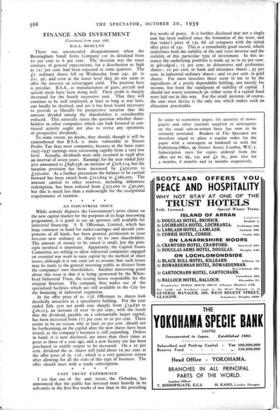FINANCE AND INVESTMENT
There was unconcealed disappointment when the Birmingham Small Arms Company cut its dividend from o per cent to 6 per cent. The decision was the exact contrary of general expectations, for a distribution as high as I2A. per cent. had been expected in some quarters. The LI ordinary shares fell on Wednesday from 24s. 3d. to 21S. 3d., and even at the lower level they do not seem to offer the investor an extravagant yield. The position here is peculiar. B.S.A., as manufacturers of guns, aircraft and special steels have been doing well. Their profit is sharply increased for the fourth successive year. That they will continue to be well employed, at least so long as war lasts, can hardly be doubted, and yet it has been found necessary to provide so liberally for prospective taxation that the amount divided among the shareholders is considerably reduced. This naturally raises the question whether share- holders in other companies which can look forward to con- tinued activity ought not also to revise any optimistic of prospective dividends.
To some extent, no doubt, they should, though it will be remembered that B.S.A. is more vulnerable to Excess Profits Tax than most companies, because in the basis years 1935-1937 earnings were recovering rapidly from a very low level. Actually, dividends were only resumed in 1938 after an interval of seven years. Earnings for the year ended July 31st amounted to £848,538, an increase of £218,114, but the taxation provision has been increased by £450,000 to L55o,000. As a further precaution the balance to be carried forward has been raised from £212,624 to £280,000. The amount carried to other reserves, including debenture redemption, has been reduced from £225,000 to £30,590, but this is much less than a makeweight for the exceptional requirements of taxation.












































 Previous page
Previous page